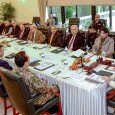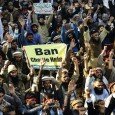By Farooq H Naiq –
Counterpoint
By the end of 1997, during the period Mian Mohammad Nawaz Sharif was Prime Minister of Pakistan, Letters of Request were initially sent by Senator Saif-ur-Rehman, Chairman Ehtesab Bureau to the government of Switzerland for mutual legal assistance and finally a Letter of Request was sent by Attorney General of Pakistan Ch. Mohammad Farooq to the government of Switzerland for mutual legal assistance in accordance with the Mutual Assistance Act of Switzerland. Through the said Letter of Request, the Attorney General of Pakistan, on behalf of the government of Pakistan, made request for collection of documents and evidence and transmission of the same to Pakistan for the purpose of their submission in the Ehtesab references/cases pending against Shaheed Mohtarma Benazir Bhutto and Mr. Asif Ali Zardari before Ehtesab Courts in Pakistan.
On the receipt of the said request, the Attorney General of Switzerland referred the matter to the Prosecutor General of Geneva within whose jurisdiction the said request related. In accordance with laws of Switzerland the Prosecutor General of Geneva referred the matter to the Investigating Magistrate/Examining Magistrate to investigate into the matter, collect documents and evidence requested for and transmission of the same to the government of Pakistan. During such investigation the Investigating Magistrate of Geneva, of his own accord, started parallel criminal proceedings for money laundering against Shaheed Mohtarama Benazir Bhutto, Mr. Asif Ali Zardari and about four or five nationals of Switzerland. During the investigation the Investigating Magistrate dropped charges against few Swiss nationals. However, the investigation continued against Shaheed Mohtarama Benazir Bhutto, Mr. Asif Ali Zardari and one Swiss national.
During its investigation the government of Pakistan filed an application for being impleaded as a damaged party / civil party in the investigative proceedings concerning money laundering. The said application was allowed and government of Paksitan’s representative along with Swiss advocates starting appearing on each and every date of hearing before the Investigating Magistrate. It would not be out of place to mention here that Shaheed Mohatrama Benazir Bhutto also appeared on every date of hearing before the Investigating Magistrate in Geneva, but Mr. Asif Ali Zardari, being in prison, could not do so. Mr. Asif Ali Zardari remained in prison on false, fabricated and concocted cases from the end of 1996 till the end of 2005. After his release he suffered heart problems and remained under constant observation of the doctors in Dubai and United States of America.
The allegations against Shaheed Mohtarama Benazir Bhutto made by the government of Pakistan was that she had purchased jewelry worth £ 100,000 payment of which was made from a bank account alleged to belong to Mr. Asif Ali Zardari. In March 2007, the Investigating Magistrate summoned the owner of jewelry shop from where the said jewelry was alleged to have been purchased by Shaheed Mohatarma Benazir Bhutto. Upon questioning the jeweler admitted that he recognized Shaheed Mohtarama Benazir Bhutto as he has seen her in a conference in Davos Switzerland and that he had also seen many pictures of her that had appeared in various newspapers. As Shaheed Mohatarama Benazir Bhutto was in the room where the examination of the jeweler was taking place, he was asked if she is the same lady who came to the shop to purchase the jewelry. He answered that he recognized the lady in the room as Shaheed Mohtarma Benazir Bhutto but she was not the person who came to his shop to purchase the jewelry. The allegations against Shaheed Mohatarma Benazir Bhutto fell to the ground on that very day but despite this the investigation against her continued.
In October 2007, the National Reconciliation Ordinance was promulgated. Through the said ordinance cases registered against various politicians and bureaucrats stood withdrawn. Furthermore, certain amendments were made in the Representation of Peoples Act 1976, concerning election laws in Pakistan.
On 27th December, 2007, Shaheed Mohtarama Benazir Bhutto was assassenated and all the cases filed against her in Pakistan including investigative proceedings in Switzerland became infructuous. However, as the cases filed against Mr. Asif Ali Zardari were not withdrawn by the government, Mr. Asif Ali Zardari filed constitution petition in the Sindh High Court, Karachi, which directed the Attorney General of Pakistan and Prosecutor General of NAB to withdraw all the cases in Pakistan and outside Pakistan. Thereafter, the NAB withdrew all the cases against Mr. Asif Ali Zardari pending in Accountability Courts in Pakistan. As far as Switzerland was concerned, the Attorney General, pursuant to direction of the Honorable Sindh High Court wrote a letter for withdrawal as damaged party in the proceedings before the Investigating Magistrate as well as for withdrawal of Request for Mutual Assistance made by former Attorney General of Pakistan.
By the end of 2007, the Investigating Magistrate had transmitted to the government of Pakistan all the documents and evidence which he had collected pursuant to the Letter of Request. As far as investigative proceedings of money laundering were concerned, the Investigating Magistrate after recording testimonies/evidence of the concerned persons transmitted the file to the Prosecutor General of Geneva for decision as to whether a prima facie case could be made out, from the evidence/documents so collected and recorded for the purpose of trial for the alleged offence of money laundering before the competent court. It is pertinent to mention here that under the laws of Switzerland Prosecutor General is the person to decide this issue.
In September 2008, by detailed order after considering the testimonies collected by the Investigating Magistrate and the letter written by the Attorney General of Pakistan, the Prosecutor General of Geneva on merit closed the file, which meant that it was not a fit case for trial before the court and that allegations of corruption and money laundering were not proved. He also ordered that an appeal against the same can be filed within ten days. However, no appeal was filed against it either by the government of Switzerland or government of Pakistan or anyone else, thereby the said order attained finality.
The Honorable Supreme Court of Pakistan in the case of Dr. Mubashar Hassan vs Federation of Pakistan, reported in PLD 2010 SC 265, declared the National Reconciliation Ordinance (NRO) void ab initio and vide para 178 of said judgment directed the Federation of Pakistan to take immediate steps to seek revival of request for mutual assistance, claims to allegedly laundered money and status of civil party. Pursuant to the said judgment of the Honorable Supreme Court, cases of the beneficiaries were reopened before the concerned courts in Pakistan. The NAB pursuant to the order of Honorable Supreme Court, faxed a letter to the Prosecutor General of Geneva, but however, the Honorable Supreme Court of Pakistan directed the Federal government through Ministry of Law and Justice to comply with the direction contained in para 178 of the judgment. According to Prime Minister Yousaf Raza Gilani , Ministry of Law and Justice, government of Pakistan prepared two summaries which were placed before him, and in good faith he acted upon the advice contained in the said summaries and also made certain observations on them. Moreover, according to him except for these two summaries he was not apprised of the proceedings of the Honorable Supreme Court although they may have been in knowledge of the Attorney General, the Law Secretary and the Law Minister.
Investigative proceedings for alleged money laundering were closed by the Prosecutor General of Geneva on merit vide his order passed in September 2008 and as no appeal was filed against the said order it had attained finality. Furthermore, sovereign position of Mr. Asif Ali Zardari, being the President of Pakistan, required that he could not be put up for trial in any foreign court including Switzerland under international law. This immunity is absolute and inviolable. It vests in the office, not in the person. It represents the sovereignty and independence of the country as well as its sovereign equality with all the states, however strong and powerful. Moreover, the documents that were the subject of mutual legal assistance request have been provided to the government of Pakistan and have been used in the cases in Pakistan. These cases resulted in acquittal of accused persons who were tried by the Accountability Courts in Pakistan except Mr. Asif Ali Zardari whose case was kept on dormant file by the Accountability Court on grounds that he enjoyed immunity from criminal trials, according to Article 248 of the Constitution of Islamic Republic of Pakistan 1973. As there are no proceedings pending in Switzerland, the status of Pakistan as a damaged/civil Party cannot be revived. Thus it can be safely concluded that the direction contained in para 178 of the judgment in NRO case has become non implementable.
The Honorable Supreme Court of Pakistan in its wisdom issued notices to the Prime Minister Syed Yousaf Raza Gillani for disobeying the order of the court i.e., the direction given in para 178 of the judgment in Dr. Mubashar Hasan case and thereafter framed charges against him under Article 204 (2) of Constitution of Pakistan and Section 3 of Contempt of Court Ordinance 2003 punishable under Section 5 of the said ordinance which charged Prime Minister Syed Yousaf Raza Gilani denied.
The Honorable Supreme Court vide short order dated 26th April, 2012, convicted Prime Minister Syed Yousaf Raza Gillani under Article 204 (2) and Section 3 of the Contempt of Court Ordinance 2003, and punished him under Section 5 of the Contempt of Court Ordinance 2003 till rising of the court.
The detailed order has still not been passed/ pronounced by the Honorable Supreme Court of Pakistan. In term of the Contempt of Court Ordinance 2003, Prime Minister Syed Yousaf Raza Gilani has 30 days to file an appeal against the order before the larger bench of Honorable Supreme Court of Pakistan, Prime Minister Syed Yousaf Raza Gilani has been convicted and punished for committing civil contempt i.e., disobeying the order of the court but not for committing criminal contempt which means obstruction of administration of justice and/ or judicial contempt which means scandalizing the court or judges. Furthermore, the Honorable Supreme Court of Pakistan vide its short order has not disqualified the Prime Minister Syed Yousaf Raza Gilani from being the Member of National Assembly.
The question of disqualification of Member of Parliament is dealt with under Article 63 of Constitution of Islamic Republic of Pakistan 1973. There are sixteen grounds in the said Article, whereby if proved, member of parliament stands disqualified from being such a member. One of such grounds is mentioned in Article 63 (1) (g). It, inter alia, lays down that a member of parliament would stand disqualified from being such a member if he has been convicted by court of competent jurisdiction for propagating any opinion or acting in any manner prejudicial to the integrity or independence of judiciary of Pakistan or which defames or ridicules the judiciary of Pakistan. In the instant case Prime Minister Syed Yousaf Raza Gillani has been convicted and punished by the Honorable Supreme Court of Pakistan for disobedience of the order of the court and not for the reason or ground mentioned in Article 63 (1) (g) as enunciated hereinabove. Furthermore, he has not been convicted for financial corruption and /or moral turpitude. The power or discretion to disqualify a Member of National Assembly vests either with the Speaker of the National Assembly or the Election Commission of Pakistan. Clause 2 of Article 63 lays down that if any question arises whether a Member of National Assembly has become disqualified from being a member, the Speaker unless he decides that no such question has arisen, refers the question to the Election Commission of Pakistan within 30 days and if he fails to do so within the aforesaid period it shall be deemed to have been referred to the Election Commission. Under clause 3 of the said Article, the Election Commission of Pakistan shall decide the question within 90 days of its receipt, or deemed to have been received.
Thus it is obvious and explicit that in the first instance the power and discretion lies with the Speaker of the National Assembly to decide the issue of disqualification of Member of National Assembly and if he fails to do so or does not do so the matter shall then be decided by the Election Commission of Pakistan. Taking the case of Prime Minister Syed Yousaf Raza Gillani it is clear that neither the Honorable Supreme Court of Pakistan nor the Speaker of the National Assembly nor the Election Commission of Pakistan has disqualified him, from being a Member of the National Assembly. Keeping in view the above discussed legal and constitutional provisions, it can be safely interpreted that Prime Minister Syed Yousaf Raza Gilani is still a Member of National Assembly, and consequently the question of his resignation from being a Member of the National Assembly does not arise at all. Thus it is totally absurd and inconceivable to ask Prime Minister Syed Yousaf Raza Gilani to resign when till date he is the Member of National Assembly and a democratically and constitutionally elected Prime Minister of Pakistan.
The writer is the Federal Minister for Law






























































































